| By Aniruddh "Andrew" Bansal
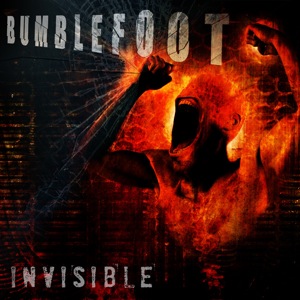 April
25th 2011, Los Angeles CA: Savor the delightful Ron "Bumblefoot" Thal as he
opens up completely and talks to me in great detail about his new single
'Invisible', his role as a producer, solo touring plans, bizarre stories from
recent Guns 'N Roses tours, teaching lessons, the future of music, and his
famous Swiss Cheese guitar. April
25th 2011, Los Angeles CA: Savor the delightful Ron "Bumblefoot" Thal as he
opens up completely and talks to me in great detail about his new single
'Invisible', his role as a producer, solo touring plans, bizarre stories from
recent Guns 'N Roses tours, teaching lessons, the future of music, and his
famous Swiss Cheese guitar.
Andrew:
I was just listening to your new single "Invisible", your
first original release in three years. Can you tell me how it came about?
Ron: It's all down to just timing and juggling everything that I'm doing.
I had put out "Abnormal" in 2008 and then Chinese Democracy came out after which
I popped out a quick acoustic EP called "Barefoot", and then for two years I was
away and couldn't really do too much. When I'm on the road I can never write.
For me to write a song, I need to be able to step away from everything going on
in music, just live the life and then write from that. So I have a hard time
writing on the road and I get kind of burned out on all the music constantly. We
finished at the end of December last year. All the words just started to flow
and I was able to start banging out songs. This is one of the first ones that
came about. Originally I had written the music in the mid 90s and that's why the
song sounds grungy. It goes back that far, I just never did anything with it.
Now, I just laid the drums and vocals and just popped it out. I didn't
over-think it. Write a song and put it out, that's all I'm trying to do now. I
do that every month and so far, I've been able to keep up with it.
Andrew:
So when will you be ready to release a full album?
Ron: Doing a full album for me takes about nine months of writing,
recording, prepping and doing everything, and I don't have the time anymore. I
can only bite off things in small pieces. So I'm able to do this "one song every
month" kind of thing. I could have put together all these songs, waited a year
and then put them out, but I'd rather give it to everybody in pieces and just
keep this constant flow of music coming out. I don't know, may be at the end of
the year I'll take all of this stuff and put it on a disc to make it some sort
of a physical embodiment of the music and not just files. But at this point I'm
not even thinking about doing an album. I'm really content just giving people a
song at a time.
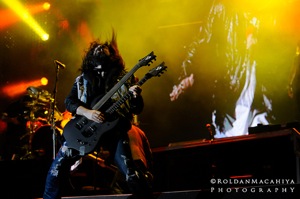 Andrew:
This single also comes in player and producer packs. Could you talk about
that? I think it's a great thing for young musicians for them to be able to
break down the song and learn it. Andrew:
This single also comes in player and producer packs. Could you talk about
that? I think it's a great thing for young musicians for them to be able to
break down the song and learn it.
Ron: Exactly, that's the whole idea. When I wanted to putt out the song,
I didn't want to just stick an mp3 on itunes. I wanted to give people a lot for
each song, all the things that I would have loved to have for songs that I was
really into my whole life. So I asked a lot of people as to what they would
like. A lot of the guitar players were into transcription and that aspect of it
all. So what I did besides putting out the song in different high-res formats
like Wav and Flac, I would take the whole song from beginning to end and
transcribe it. This was the most time consuming thing. It meant figuring the
song out, and then going into transcribing software, doing the musical notation,
the tablature, the fingers, picking, and making a PDF file of it all, taking
care of the type setting and making sure everything is right. So I put that out
along with a backing track that has all the music except for the guitar parts,
so that you can learn the transcript and play it along with the backing track.
Then as an audio guide for the transcription, I would also include a mix that
has all the guitars boosted up very loud, and the music in the distance so that
you can get a really good listen as to how it should sound. That's for the
guitar players out there. I call that the Player Pack. Then what I do for the
Producer Park is, I take all the stems of the recording and take each individual
apart, so you got the drums, bass, rhythm guitar, lead guitar, vocals, backing
vocals and anything else going on. You can load all the wav files into a multi
track software and you can make your own mixes, single stuff out, make edits and
do whatever you want with it. So it's a lot of stuff you can do with each song.
Andrew:
When the full length eventually comes about, how do you think
it'll compare to the previous release "Abnormal"?
Ron: I don't know what it's going to sound like in the end. It's hard to
say. Hopefully it'll be as good or better, and not worse (laughs). But as far as
what kind of music it'll be, jazz, death metal or whatever else, I have no idea.
Whatever is going to come out, will come out and I just go by where my life is
at that point.
Andrew:
Is "Invisible" a digital-only release or will you be putting
out a physical release as well?
Ron: If I do anything of that sort, it'll be at the end of the year as a
kind of 2011 CD. But so far everything is just 0s and 1s, just the digital shit,
that's it (laughs).
Andrew:
The reason why I asked is because I think the artwork is
great, and I would love to see it being released on a 7-inch or something, for
people to be able to get a hold of it.
Ron: Yeah, the art totally kicks ass. There's this guy in Australia, he's
like my official artist now. I love his artwork so much, he's been doing all my
stuff. He's phenomenal. So he did that art and we made a shirt of it. This time
I went for full color digital printing so you get the full image and it's not
just a cutout. So yeah, it's kickass art.
Andrew:
You've also been known as a DIY producer. So in your opinion,
what's the role of a producer in any artist's music? How much do you think a
producer is involved?
Ron: For me, my feeling is that when I'm producing something, I am
overseeing the entire process and I'm responsible for what people hear in the
end. So, that being said, the songwriting, the arrangement of the songs, the
sound of the instruments, the performance and how they are playing it, the mix,
the mastering and every single thing about it. It's like being a psychologist
for the musicians and controlling every little thing. Whatever I do as a
producer is hands on. I pick the mics, and do every single aspect of it. It's a
huge responsibility but I love it and I enjoy it very much.
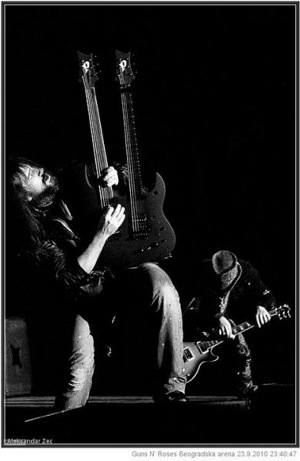 Andrew:
Is there any chance for you to go out on a solo tour? I know there's hardly
any time for you to do that, but is there a possibility? Andrew:
Is there any chance for you to go out on a solo tour? I know there's hardly
any time for you to do that, but is there a possibility?
Ron: Well, it's something I haven't done since 2005. I had one tour
planned in 2006 but I had to cancel it, because it conflicted with the GNR tour.
I tried to book some shows in 2007 to coincide with different cities we were
going to be playing at, but it didn't work out because plans changed and it just
became so difficult. The problem I have is, for me to book a tour I have to do
it six months in advance. With GNR, things happen very last minute, when
everything is confirmed and good to go. I get just a month's notice a lot of
times. So what happens is, whenever I book something months in advance,
something else comes up and I have to cancel it all. I just hate doing that.
There's nothing I hate more than canceling a show. So rather than all the wasted
promotion, cost, and all the disappointment from people who were planning to go
to those shows, I just gave up on trying. I figured that at some point when I
know there is going to be a big hiatus on the GNR side, then I can make some
plans. But before I can make any plans, honestly I need to get my own shit back
into shape. I haven't done my own stuff for so long that I need to really bust
my ass and get used to singing and playing all that crazy stuff again. With GNR
and with most of the things that I do when I'm playing live with somebody, I
just play guitar and it's pretty easy in comparison to my own stuff on guitar on
my albums. Then having to sing on top of that and doing both at the same time, I
definitely need to get myself back into that. I started last night, just
relearning all the solos. Crazy shit man, what the hell was I thinking? (laughs)
Andrew:
You did a GNR tour in 2009-10. You met a lot of the fans on
that tour. What was that like for you?
Ron: Now see, that stuff is like my favorite. When I go on tour, I do the
shows, the shows are great. But it's everything else, it's the human interaction
that surrounds it is what you really remember to take with you. I can't remember
the specifics of how we played a song on any given night, but I can pretty much
tell you the date of every show we played, where I was, who I met, what I ate
and who I hung out with, and what bizarre thing happened. I would take it upon
myself to make all these contests. They all worked out really well. I did a
bunch of meet n greets in summer last year in Europe and Moscow. When we were in
South America, I had this thing where people would just write in and I would
randomly pick people to get backstage passes, to hang out, get guitar lessons
and lot of the times they got to meet Axl too and take pictures with him. There
were always some really nice people. It was a lot of fun and great memories for
them, just something out of nowhere. For Australia, we had the 2-year
anniversary of Chinese Democracy coming up. So I had people singing Chinese
Democracy songs backwards, where the last word was first and the first word
last. So for "There Was A Time", it was "Time A Was There", and they had to go
through the same melody, but starting with the last word. It was kind of crazy
(laughs). It just felt like a different language and there was something very
eerie about it. It just screws with your mind. The other thing they had to do as
a contest was, they had to do a little dance hopping around on one leg with a
full quart bowl of soup over their head. It would spill all over them as they
were singing happy anniversary songs. So this one guy went into the middle of
the street wearing a really nice business suit and the soup was splattered all
over him. Cars were honking at him, and he won. So he got tickets to the show,
hung out backstage. I also got in touch with some of the other contestants who
already had tickets to different shows. I gave them backstage passes so we could
all hang out. So that's the kind of stuff I dig. That's the kind of thing that
happens just once and not the same way.
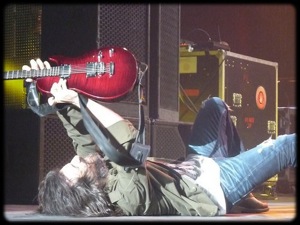 Andrew:
Since you said that you remember everything that happened on the tour, what
was the most bizarre thing that happened? Andrew:
Since you said that you remember everything that happened on the tour, what
was the most bizarre thing that happened?
Ron: Let me see (laughs). I mean, there's always bizarre things that
happened. I guess one thing that comes to mind is the whole series of events
surrounding a gig we had scheduled in Brazil. There was an acoustic show that we
were asked to play, and we had said no because we were playing three shows in a
row and then this was way too much for any singer to do. We had two big shows
after that night. It was the acoustic show in Sao Paulo and then we had the big
arena show, and the next night in Rio. It was totally up to Axl if his voice was
up for it. We said that if it doesn't jeopardize his throat, we would do the
show. When the time came, we said we can't risk it. So we didn't do it, but the
people that were running the event had advertised it anyway even though we
hadn't agreed on doing it. So it was like we were being pushed into it. So I
guess they freaked out when we didn't do it. There was a lot of violence and a
lot of negative rumors started, so there was that. The next night we played Sao
Paolo and it was great. And then in Rio, while the crew was on the way to the
venue, the bus broke down. They were stranded for about two hours and it delayed
setting everything up for that show. So they got there, started setting
everything up and suddenly a big storm hits. It was a fucking tornado. From what
I understand and from what people told me, there had never been a tornado in
Rio. This was the only one ever, and it hit our stage. A saw a video of it
because we weren't there yet, and there were pieces of sheet metal flying
through the air at 80 miles an hour that would just cut people in half. The
whole right side of the stage collapsed down and landed right in front. It would
have taken out the first 30 feet of people. There would have a lot of death and
a lot of injuries. The only reason it didn't kill a bunch of people was that
they had to delay opening the doors because the bus broke down. So if the bus
hadn't broken down, a lot of people .. So it was like a series of crazy events.
And then, Sebastian Bach was opening for us. His bus full of gear went off the
road, flipped out into a ravine and his whole gear was smashed. This was all in
a matter of 48 hours. So of course, that show was cancelled. Outside the hotel,
there were 60-100 fans, they were crying because so many of them waited so long
for this and flew out to be there. Someone had an acoustic guitar and I just
started hanging out with him, and playing songs. I ended up making it just a
private little acoustic show for them, two hours of just singing and playing. So
at least we were able to do that together, just me and them. So the next morning
the crew had to go through this pile of twisted metal and broken gear which got
rained on all night. The wood was all soaked, everything was messed up. They
loaded it into trucks, got it into the next town, repairing and replacing what
they could, and they managed to be able to make the next show happen right on
time. It was incredible. I'll never forget that. I don't know how the hell they
did that. This is just one of I don't know how many stories, you know (laughs).
Andrew:
One thing you also told me earlier was that you go to music
schools and arrange clinics. How much do you enjoy doing that? That's also one
kind of interaction which people enjoy from musicians.
Ron: Yeah, just last weekend I drove out and visited a high school class
in New York. A friend of mine was with them. I came out and spent two hours just
talking to them, playing little bits of songs on my guitar, talking about how to
make music, crazy road stories, life lessons and all that kind of stuff. So
yeah, any chance I get to do this kind of stuff, I take it. I started taking
guitar lessons when I was seven, started teaching by the time I was 13 and stuck
with it. For me, doing that stuff is important and just feels like something
that needs to be done for your soul, and part of being human is to take what you
have, what you know and what you've learnt, and give it to the next bunch for
them to carry that torch.
Andrew:
I also saw one of your blog posts in which you talk about the
future of music. Currently, what do you feel about it? What direction do you
think the music business is heading in?
Ron: It evolves so fast and it's all about technology. In the last 30-40
years, the styles of music we have only exist because of the technology that
developed and allowed for it. So it's the same thing with the music business and
how we distribute, promote, make our music, and connect with people who listen
to it. The bandwidth is getting larger and 3G is turning into 4G. I think
there's going to be a lot more streaming. The CD sales went from CD Baby who
started doing it for independent artists to Amazon who came up with the Amazon
Advantage Program back in the late 90s. The thing that's going to happen now is,
companies are going to start making streaming services solely for independent
and unsigned artists. It's an idea that I've had and been thinking about doing
myself, just making some kind of streaming service. I think there's going to be
a lot more of that coming up, though I have my own biases about the music
business based on my own experiences and the experiences of everybody I've met.
I've always been about empowering indie artist and not trying to be part of this
half-flawed system that has screwed its own artists and in essence screwed
itself.
Andrew:
How much importance do you give to social networking these
days? Promoting is all about facebook, twitter and youtube and all of that
stuff.
Ron: Yeah, at this point, that is your distributor, your publicist and
your PR company. All the reasons that people had to get signed in the past, you
can kind of do all of that yourself now, or get a friend to help you do it. I
talk a lot about how you don't need labels and this and that. I'm not talking
about bands like Aerosmith, Metallica or Guns, but I'm talking about and talking
to the kid that is just starting out, and bands who've been at it for a couple
of years, the 99.99 per cent of people making music out there. You don't need
give away your publishing rights, you don't need to give away the right to
record in the ownership of your music. You don't need to seek out a loan you can
never pay back. I think even labels would agree that they don't want to deal
with bands that they have to raise from infancy. They want to deal with bands
that have something going on. So even if you go on and get signed to a label,
you need to do all the stuff I'm talking about. Music is your baby, think of it
that way. You need to feed and clothe that baby and raise it, do your best for
it. So social networking is your means to connect to the rest of the world. You
don't have to pay for a thousand ads in magazines and you don't have to pay to
have your album in the front of the record store in the listening booth. Now all
you need to do is just reach out through the internet, and to find a creative
way for people to pay attention to you amongst the other millions that are also
doing it.
Andrew:
Since you talked about singing songs backwards, have you
played any of your songs backwards, specially the "Guitars Suck" thing that you
did?
Ron: Yeah, when I play things backwards, there is a hell of a lot of
fucked up messages that I heard. When you put on albums backwards, you hear
stuff. When you hear my songs backwards there is a lot of fucked up shit in
there. That's what you should do, you should all go and check out my songs
playing them backwards. You won't believe what you fucking hear. I was just
kidding (laughs). But I have listened to songs backwards from a songwriting
stand point. I remember when I was ten years old, I had the Scorpions' Blackout
album and for some reason I just felt the need to listen to that album
backwards. The songs were just as good.
 Andrew:
Finally, I wanted to ask you about the Swiss Cheese guitar. That is the most
unique guitar I have ever seen. You did that, and then stopped using it in the
late nineties. How did that idea come about and why did you stop using it? Andrew:
Finally, I wanted to ask you about the Swiss Cheese guitar. That is the most
unique guitar I have ever seen. You did that, and then stopped using it in the
late nineties. How did that idea come about and why did you stop using it?
Ron: Originally, that started off as an Ibanez guitar. I would paint Iron
Maiden album art for like 20 bucks each, and I had saved up enough money to get
an Ibanez Roadster guitar. That was in 1984 when I picked it up. Over time, I
got into modifying and re-building my guitars. That guitar went through a couple
of changes. One of them was when I had a drill and a router, and I tried to make
it look like I took a bite out of one part of the guitar. It didn't quite work,
and I was just like, fuck it. And I just took random sized bits off of it, and
slammed holes through the fucking thing. I then looked at it, and said, "Yeah,
this looks cool". I took a slice of swiss cheese, went to a paint store and kind
of snagged it on the table, telling the guy to make that color on the guitar.
The guy looked at me funny for a couple of seconds. He said, "You know, a week
ago someone came in holding a walnut and asked me if I can match that color
too". So it was kind of strange for him, people bringing in food. So he made up
the thing. I had a little paint sprayer in the garage, and yeah I made that
guitar. I have Dimarzio pick-ups in there. It must have been around 91. So I've
been with them for about 20 years now. I tried different pick-ups and finally
found this really cool set-up. That was my main guitar that I toured with for 13
years. Then I met up with Vigier guitars in France. I was touring there in 1997,
and one of their reps came to a show with a guitar and wanted me to check it
out. It felt a hell of a lot better than my guitar. I wasn't looking for any
endorsements and was intent just building my own Frankenstein monstrosity, but
these things played really nice and I spoke to them. Everyone was cool at the
company. We started talking about things and we made a little deal. From that
point on, they made all my weird guitars instead of me. They do it much better
than I can. So I'm leaving it to the pros. They did make about 10 or 11 replicas
of that exact Swiss Cheese guitar. I have one left, and hopefully at some point
this year I want to auction it off for medical research or disaster relief. I
have the last remaining one.
Check out Ron
Thal's official
website. |
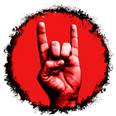

 April
25th 2011, Los Angeles CA: Savor the delightful Ron "Bumblefoot" Thal as he
opens up completely and talks to me in great detail about his new single
'Invisible', his role as a producer, solo touring plans, bizarre stories from
recent Guns 'N Roses tours, teaching lessons, the future of music, and his
famous Swiss Cheese guitar.
April
25th 2011, Los Angeles CA: Savor the delightful Ron "Bumblefoot" Thal as he
opens up completely and talks to me in great detail about his new single
'Invisible', his role as a producer, solo touring plans, bizarre stories from
recent Guns 'N Roses tours, teaching lessons, the future of music, and his
famous Swiss Cheese guitar.  Andrew:
This single also comes in player and producer packs. Could you talk about
that? I think it's a great thing for young musicians for them to be able to
break down the song and learn it.
Andrew:
This single also comes in player and producer packs. Could you talk about
that? I think it's a great thing for young musicians for them to be able to
break down the song and learn it.  Andrew:
Is there any chance for you to go out on a solo tour? I know there's hardly
any time for you to do that, but is there a possibility?
Andrew:
Is there any chance for you to go out on a solo tour? I know there's hardly
any time for you to do that, but is there a possibility?  Andrew:
Since you said that you remember everything that happened on the tour, what
was the most bizarre thing that happened?
Andrew:
Since you said that you remember everything that happened on the tour, what
was the most bizarre thing that happened?  Andrew:
Finally, I wanted to ask you about the Swiss Cheese guitar. That is the most
unique guitar I have ever seen. You did that, and then stopped using it in the
late nineties. How did that idea come about and why did you stop using it?
Andrew:
Finally, I wanted to ask you about the Swiss Cheese guitar. That is the most
unique guitar I have ever seen. You did that, and then stopped using it in the
late nineties. How did that idea come about and why did you stop using it?